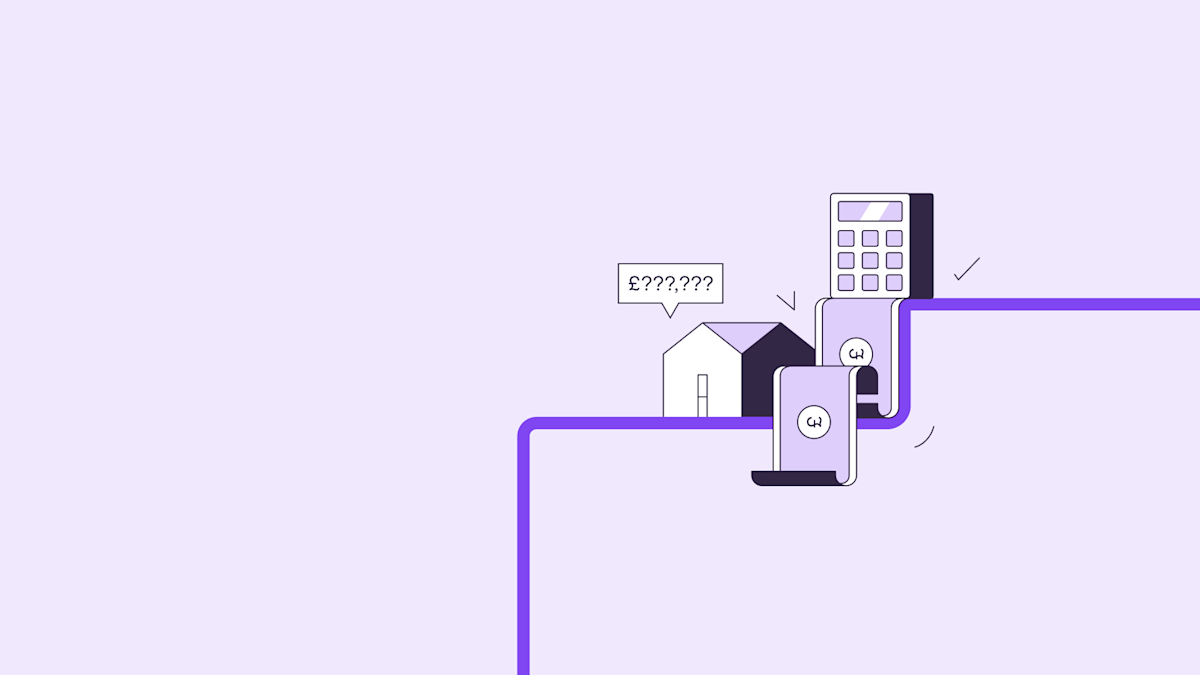Buying a home is complicated. And it may seem especially daunting if you’ve never bought one before.
Let's go through all the steps you'll need to take to own your own place.
1. Saving for a deposit
The first thing to work out is how much cash you can put towards a deposit for your first home.
Whether it comes from savings you’ve been squirrelling away, or through family help, mortgage lenders like bigger deposits.
And they offer lower mortgage rates to those who have them, meaning the monthly repayments will be lower.
You’ll usually need a minimum deposit of 10% of the home you want to buy. That said, there are now quite a few mortgages available that only require a 5% deposit.
If you’ve got more in the bank, then a 25% deposit (or more) will give you access to better mortgage deals.
It’s worth starting to save as soon as you can. There are some great schemes out there to help, like the Lifetime ISA (LISA), where the government chips in £1,000 a year if you can save £4,000.
Know your budget in 2 minutes
Discover your maximum borrowing power
Establish your monthly repayments
See homes you know you can afford
With no fees and no credit checks on your finances.

2. What to do if you haven’t got a deposit
Help is at hand. A range of government and developer-backed options specially designed to help first-time buyers step onto the ladder are available.
Own New Rate Reducer lets you buy a home with a low interest mortgage rate for a fixed period of time
Shared Ownership allows buyers to purchase a share of a property and pay rent on the remaining share
First Homes helps local first-time buyers and key workers by offering new-build homes at a 30% - 50% discount
A Lifetime ISA allows first-time buyers to save up to £4,000 a year, with the government adding a 25% bonus
The 95% Mortgage Guarantee Scheme means the government ‘guarantees’ mortgages for buyers with 5% deposits
Launched by the house-building industry, Deposit Unlock is a new scheme to enable you to buy a new-build home with just a 5% deposit - and you don't need to be a first-time buyer to qualify
3. Get a mortgage
Unless you’re swimming in cash, you’re going to need a mortgage to buy your first home.
From repayment mortgages to interest-only mortgages, there are lots of different types available - and you'll need to work out which one works best for you.
What types of mortgages are there?
Save money with Mojo Mortgages
Allow award-winning Mojo to show you the best rates available to you. A whole-of-market broker, Mojo work with over 70 lenders. And they won't charge you a penny for their services.

4. Account for extra buying costs
Solicitor’s fees, mortgage fees, stamp duty and other costs can add up when buying a home.
Here's a snapshot of the typical costs incurred when buying a home:
| Type of cost | Estimated cost |
|---|---|
| Conveyancer/ solicitor’s fees | £2,000 |
| Mortgage arrangement fees | £1,000 to £2,000+ |
| Mortgage booking fee | £100 to £200 |
| Valuation fee | £150 to £800 |
| Property survey | £400 to £1,500 |
| Removals | £150 to £2,000+ |
| Stamp duty | 0% to 12% of home value |
Stamp duty
Your biggest extra cost is likely to be stamp duty. Stamp duty is a tax paid when you buy property or land over a certain value in England, Wales and Northern Ireland.
How much you pay depends on the value of your property. The more expensive it is, the higher the amount of tax you’ll pay.
Stamp duty calculator
How much stamp duty will you need to pay? Let our calculator do the maths. Here's how stamp duty works.
Crucially, first-time buyers benefit from a stamp duty exemption rule.
If you’ve never owned a home or other property before, up until April 1, 2025, you’ll pay no stamp duty on the first £425,000 of a home worth up to £625,000.
For homes worth over £625,000, the discount does not apply.
Between £425,000 and £625,000 a rate of 5% will apply. But it will only apply to that slice of the price, rather than the full amount.
First-time buyer stamp duty rates until April 1, 2025
| Property price | Percentage of stamp duty paid |
|---|---|
| £0 - £425,000 | 0% |
| £425,000 - £625,000 | 5% |
| £625,000+ | Normal stamp duty rates apply |
However, after April 1, the stamp duty threshold will lower to £300,000, meaning first-time buyers will start paying stamp duty on any portion of the property they're buying that's over that amount.
First-time buyer stamp duty rates from April 1, 2025
| Property Price | Stamp duty percentage to pay |
|---|---|
| £0 - £300,000 | 0% |
| £300,000 - £500,000 | 5% |
| £500,000+ | Normal stamp duty rates apply |
Find out more about the first-time buyers' stamp duty break
Find out more about stamp duty if you're not a first-time buyer
Mortgage costs
You might be getting a big sum loaned to you to buy a home, but you’ll need to factor in the cost of securing a mortgage. This is known as a mortgage arrangement fee.
A mortgage arrangement fee is usually £1,000 to £2,000, but will vary depending on the mortgage deal on offer.
Your bank or building society might also ask you to cover the cost of assessing the value of the home you’re buying. This is known as a valuation fee.
Survey costs
It’s not a legal requirement to have a survey on a property you're buying, but it could end up saving you thousands of pounds in the long run.
There are three types of survey available: a condition report (basic), a homebuyer report (suitable for buildings under 50 years old) and a building survey (very thorough).
A survey will cost you between £400 and £1,500 depending on how much detail you want.
What type of survey do I need?
Solicitors’ costs
When buying home, you’ll need a property solicitor. They might also be known as a conveyancer.
A property solicitor’s job is to help you manage the legal side of your home purchase. It will usually cost you around £1,200 to £2,000 for all the legal work.
It may be tempting to do it yourself, but trust us, it’s worth paying for a professional’s help.
They'll draw up the contract, deal with the Land Registry and manage the stamp duty charges. The Land Registry fees will vary depending on how much your property is worth.
What a solicitor does to help you buy a home
Find trusted conveyancers in minutes – no stress, just results
Save time and money with our quick and easy comparison tool, designed to connect you with trusted conveyancers across the UK.
Trusted by thousands of UK homebuyers.


5. How to find your first home
Ready to find a home? Search millions of properties for sale on Zoopla and we'll help you find the perfect one.
Here are some handy tools to get you started:
Find homes with driveways, offices or lovely big gardens with advanced search
Look in the areas (or even on the streets) you love by drawing a search map
Search for homes near work, the station or your favourite pub with our travel time tool
Be the first to hear when a new property hits the market: register and sign up for alerts
If you're after a stylish and eco-friendly property, search new-build homes for sale
Eight tools to help you find your new home
Ready to find your dream home?
Search more than half a million properties for sale, from brand new homes to period homes.

6. Making an offer
Once you’ve found your dream home, you’ll need to put in an offer.
You do this by telling the estate agent managing the home what you can pay for it, and detailing the position you’re in. The agent will then pass your offer on to the homeowner.
Your offer can be made in person, over the phone or via email.
You may need to provide proof that, as a first-time home buyer, you can secure a mortgage. This might be an Agreement in Principle from the bank that's offering you a home loan.
As a first-time home buyer, you're in a strong position to negotiate because you're not part of a chain. And sellers like this.
How to decide what offer to make on a property
7. From acceptance to completion
You’re on the final stretch of the home buying journey. The rest of the legwork is largely managed by solicitors.
As with any home sale, there are things that take time and that may go wrong. Either you or the person selling to you could pull out of the sale before contracts are exchanged.
Things you can do to keep your home sale moving forwards
Your first job is to secure the mortgage that you had agreed in principle. It usually takes around four weeks for a bank to formally give you your mortgage offer, and for you to pay to secure it.
Your solicitor will start all the legal and administrative work associated with transferring the property, known as conveyancing.
That includes arranging Stamp Duty, contacting the Land Registry, transferring money during the sale, and acting as a general intermediary between you, the lender and the seller.
Once the terms of the sale have been agreed and your mortgage approved, the contracts are ready to be exchanged.
At that point, the sale becomes legally binding and you'll need to pay your 10% deposit.
On completion day, you'll be able to pick up the keys and open your new front door. Don’t forget to take a picture to remember this major milestone!
Still have questions about the buying process?
Find further help and step-by-step information in our complete buying guide.

